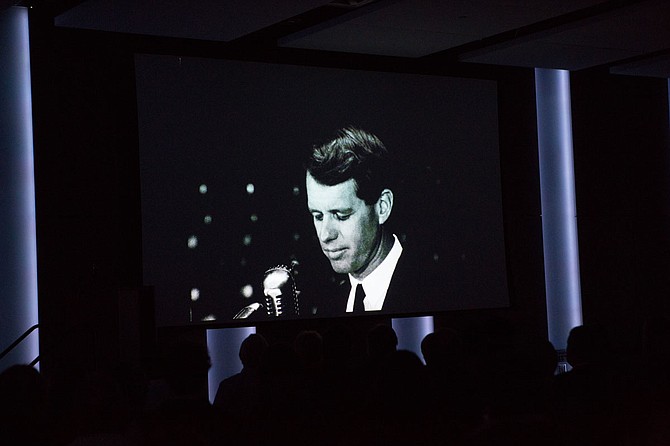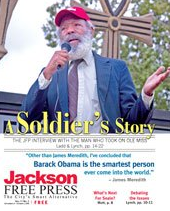Mississippi filmmaker Mary Blessey reveals that black and white University of Mississippi students together made a deal with Robert F. Kennedy in the 1960s to expose a secret about former Gov. Ross Barnett that may have cost him another term. She held an advance screening of her film at the Mississippi Civil Rights Museum on Dec. 11, 2019. Photo courtesy Mary Blessey
Early this month, I spent several days in Oxford and was on and off the campus of the University of Mississippi. Although you see far fewer Colonel Rebs and Confederate flags there these days (other than the one still in the Mississippi flag), I drove past multiple "Ole Miss" signs all along the way. That label is now acknowledged to have been the name that enslaved people called the white mistress, who in many cases owned people themselves, especially after their husbands died. (I've recently discovered at least two of these women, I'm sorry to say, in my own family tree.)
One morning in Oxford, I drove to campus to visit with Arielle Hudson, the 22-year-old senior from Tunica who had just become that university's first black woman to win a Rhodes scholarship, meaning she's headed to that other Oxford this fall to deepen her studies and further her career. Just the day before, the Jackson Free Press had published a column Hudson wrote calling for the Confederate statue that greets visitors at the public college's main entrance to be moved to a Confederate cemetery on the edge of campus. I noticed in that piece that Hudson pointedly uses "UM" instead of "Ole Miss" as this newspaper strives to do consistently as well. We believe that public dollars shouldn't help fund the use of the nickname of a slaveholder as a point of pride.
As we walked slowly around the crowded grove during a class change and past the statue of James Meredith, Hudson talked about the importance of black students feeling more welcome at what she calls the "flagship" university of Mississippi (that label admittedly makes this Mississippi State graduate cringe a bit), just as she had in the column the day before.
I couldn't agree with her more about Confederate symbols and language sending harmful messages about the university, its students and the state to the world. Anyone who proclaims that a statue or a flag celebrating a war to maintain and extend slavery does not hurt young people growing up in Mississippi is clueless about both their feelings and the power of such symbolism.
It was powerful to hear both Hudson's appreciation for the institution that helped her become a Rhodes scholar alongside her forthright determination to do her part to bring it fully into the 21st century with honesty and an unapologetic focus on teaching all Mississippians the real history of our state, warts and all.
Some of those warts, and efforts to excise them, have long been hidden from view.
Time for the Facts, Ma'am
I thought of Hudson as I watched the premiere of Mary Blessey's new documentary, "You Asked for the Facts," at the Mississippi Civil Rights Museum the next week. Blessey was an intern for me at the Jackson Free Press several years back and comes from a prominent white family in Biloxi. Her dad, Gerald Blessey, was the mayor for a time.
The film was one big surprise for many of us there. That includes James Meredith and his wife, Dr. Judy Meredith, who is also a filmmaker, who sat in the front row watching powerful footage of the 1962 "Ole Miss" riots when Mr. Meredith became the first black student to enroll there. He had walked through campus much differently than Hudson and I had, as students of all races acknowledged her with waves and smiles. He was surrounded by federal marshals and not flinching at either white students yelling the n-word at him or cherry bombs blowing up near him. This story is well known.
A Soldier's Story: The JFP Interview with James Meredith
Donna Ladd and Adam Lynch interviewed Mississippi icon James Meredith in his Jackson home in 2008. His answers might surprise you.
I also knew that then-U.S. Attorney General Robert F. Kennedy had negotiated with racist Gov. Ross Barnett—you know, the one the reservoir here in Jackson is named after, promoted on cringeworthy green signs on Interstate 55—over how the feds would enforce the black trailblazer's entry. But this film, containing remarkable footage from the era, some of which I'd never seen, reveals far more about what happened next with RFK and UM.
Back then, Mississippi governors could not serve two consecutive terms, so fiery racist Barnett could not run for re-election, but he could run again four years later, which he did. But there were a number of white progressives (especially by Mississippi standards) who did not want Barnett-the-buffoon back in the Governor's Mansion here in Jackson. So, a black undergraduate who was in the Young Democrats with Blessey's dad, and several white law students cooked up a strategy to reveal publicly to Mississippi voters just how far Barnett had gone to negotiate with RFK back when Meredith entered the university. It was as absurd as making Kennedy promise that the federal marshals would point their guns directly at Barnett before he allowed Meredith entry. Barnett's demands likely caused the riots to be more deadly, the film posits.
It was the kind of reveal that could turn off people on both sides of the issue.
So in that stealthy way that can be so infuriating in today's politics in Mississippi, a group of Ole Miss students—including Mary's outspoken father, Edward Ellington and others—helped cook up a plan for Robert F. Kennedy to speak to law students, then be asked a question that he would then answer by outing Barnett's public chicanery and deals with him. Donald then traveled to Washington, D.C., to secure the deal with then-Sen. Robert F. Kennedy and got him to agree to return to Ole Miss to speak and help carry out the plan. I don't want to spoil the film's dramatic impact by revealing too much about what happened next, and exactly what RFK said to UM students and their response, but let's just say that it had a remarkable outcome and reception.
Oh, and Barnett lost. Not to mention, Cleveland Donald Jr. returned to UM after getting a Ph.D. in history at Cornell University to become the first director of black studies there.
The film is so powerful in part because it reveals a secret that shows a more decent and less selective side of some white Mississippians and our history than the national narrative tends to admit.
But the documentary also indirectly speaks to an uncomfortable current truth about Mississippi culture and politics. Most people in Mississippi who do not agree with the radical-conservative, racist status quo have always been afraid to speak publicly about it—certainly at least the white ones. Some, like men in Blessey's film, did anyway even then when it could come at great cost.
I get that speaking out against powerful bigots was more dangerous then, and I don't judge the need to keep Barnett out of office then by any means necessary. But learning about this secret effort in the 1960s does make me wonder when and if more white Mississippians who do not agree with other white people who control our election outcomes now will fully come out of the shadows and talk openly about our real history and its effects today. When will more white Mississippians leave the shadowy (and unsuccessful) strategies of appeasing white conservatives behind and show more courage in openly embracing, and maybe even electing, citizens of all races and genders to prominent offices? When will they fully mothball the state's bad habit of pretending that talking frankly about the past only "dredges up" painful memories rather than understanding that our solutions lie in facing our entire history and its legacies?
The RFK stunt seems to have worked, at least in part, to defeat Ross Barnett, but as the last election weeks ago in November showed as did the unsuccessful effort to change the Mississippi flag back in 2001, stealthy stunts to elect somewhat-progressive candidates by pandering to conservatism and bigotry are not working today. In so many ways, it's time to let go of past habits and trickery and symbols of disrespect and just talk very honestly to Mississippians. All of them. In so doing, it's probable that the voting base in Mississippi will grow and make it more possible to keep smart young people like Blessey and Hudson inside the state, or least returning when it makes sense for them.
By the way, see Mary Blessey's film when it screens or comes to a film festival near you. I hope to sponsor another screening soon myself. It is eye-opening on so many levels and badly needed food for thought.
Charles Overby, Prisons and Journalism
Speaking of "Ole Miss" and the opening of eyes, reporter Seyma Bayram and I were among a handful of reporters who attended the Making and Unmaking Mass Incarceration Conference in Oxford earlier this month. I'd wondered when we registered for MUMI why it was being held off-campus at The Lyric, especially since UM professors were organizing it.
Refugees Locked Up In Mississippi: ‘Family Values?’
Private prisons in Mississippi used to house immigrants who committed felonies; now they're housing refugees. Ashton Pittman reports.
The answer came from the main organizer, UM history professor Garrett Felber, in the opening session, when he revealed that they had originally planned to hold it at the Overby Center for Southern Journalism and Politics, founded and chaired by former journalist and editor Charles Overby. Overby is a prominent name in the journalism world largely due to his former role as chairman and CEO of Gannett-founded Freedom Forum and of the Newseum in Washington, D.C.,(which is now closing and still drawing not-great reviews), and being at The Clarion-Ledger when it won a Pulitzer back in better days.
In another UM-related surprise to me and many others, Felber announced that Overby has long been a stockholder and compensated board member of CoreCivic, formerly known as Corrections Corporation of America, since 2001. This is the controversial corporation known for kicking off the era of private prisons back in the early 1980s. It runs facilities in Mississippi and other states, drawing much criticism, but has long had support from many conservatives including former Gov. Haley Barbour, one of the world's most powerful lobbyists whose clients have included the government of Ukraine, the Saudi Royal family and his alma mater, the University of Mississippi.
In 2004, the private-prison company quoted Gov. Barbour praising its new contract to house prisoners at the Tallahatchie County Correctional Facility in Tutwiler, Miss.
"By moving these 128 inmates to the Tallahatchie County Correctional Facility, the Mississippi Department of Corrections estimates a savings of approximately $600,000.00 over this eight-month period," Barbour said in the statement. Mississippi is gaining two ways, continuing to provide Public Safety and saving taxpayers money." It also quoted Mississippi Department of Corrections Commissioner Chris Epps: "The Mississippi Department of Corrections is committed to housing inmates securely at the least possible cost to taxpayers." Epps is now in prison for corruption.
But before Epps was busted, he closed the CCA-operated Delta Correctional Facility, which had closed before Barbour ran for governor the first time in 2003 pledging to re-open it, which he did.
Oh, and CoreCivic has contracts to house detained immigrants, including in Natchez, Miss, where the company renewed its contract with ICE for five years in September.
Overby was also on the board when the private-prison corporation fought against a law that would have required private prisons, which are typically paid with public funds, to be more transparent. Clearly, being connected to an organization that fights against public transparency is ironic for anyone connected to journalism, and especially to nonprofit organizations that stand for First Amendment freedoms. In fact, when Overby received the 2015 Legacy Award from the Ole Miss Women’s Council for Philanthropy, UM called him "a champion of the First Amendment and the free press."
It turns out that Overby's CoreCivic association is one of those open secrets that many know but few talk about inside the state. (Overby's main home is in Tennessee, where CoreCivic's headquarters are as well.) One prominent UM graduate told me in Oxford that Overby brings CoreCivic associates to UM football games. That's not illegal, of course, but it's still astounding information about a man with so many journalism ties.
No, it is not uncommon for those who control the flow of journalism in many ways to also have corporate interests, but on the scale of how disturbing those corporate interests are, I'd put private prisons very close to the top of the list. Still, Overby has been in a decision-making capacity on many journalism-related boards including here in Mississippi, from the UM journalism school (which doesn't mention his prison ties in his write-up there) to the Mississippi Today website launched in 2016.
Dossier: Donna Ladd's Eye on Mississippi
Read the Jackson Free Press editor's weekly report on government and media accountability in Mississippi.
It's not like this hasn't been somewhat reported nationally, it turns out; it's just one more example of the Mississippi blackouts that happen around powerful men who invest their money inside Mississippi, more of which you can read about in my past Dossiers. Mississippi should not be a state where these kinds of associations are ignored or only whispered about—or where someone considered a journalism stalwart has two different bios for corporate and for journalism audiences, with the latter not mentioning the former. I respectfully submit that this non-disclosure is not a good example to set for young journalists at UM, and I salute Professor Felber for putting Overby's bios side-by-side on a large screen at The Lyric and bringing the information to the public's attention at a forum designed to address problems inherent in mass incarceration, including the private-prison industry's practices, profit and transparency.
Part of this newspaper's ethos has long been that Mississippians must be treated every day as if we can handle the truth, wherever it lands politically, and we deserve to know the whole story. When that starts happening more consistently in Mississippi media, elections and other forums, I'm quite confident that the people of this state will surprise the nation.
Information is power, and everyday Mississippians need more of both.
Donna Ladd is the co-founder, editor-in-chief and CEO of the Jackson Free Press. Follow her on Twitter and read her blog at donnaladd.com. Email truth-to-power story tips to [email protected].
More like this story
More stories by this author
- EDITOR'S NOTE: 19 Years of Love, Hope, Miss S, Dr. S and Never, Ever Giving Up
- EDITOR'S NOTE: Systemic Racism Created Jackson’s Violence; More Policing Cannot Stop It
- Rest in Peace, Ronni Mott: Your Journalism Saved Lives. This I Know.
- EDITOR'S NOTE: Rest Well, Gov. Winter. We Will Keep Your Fire Burning.
- EDITOR'S NOTE: Truth and Journalism on the Front Lines of COVID-19






